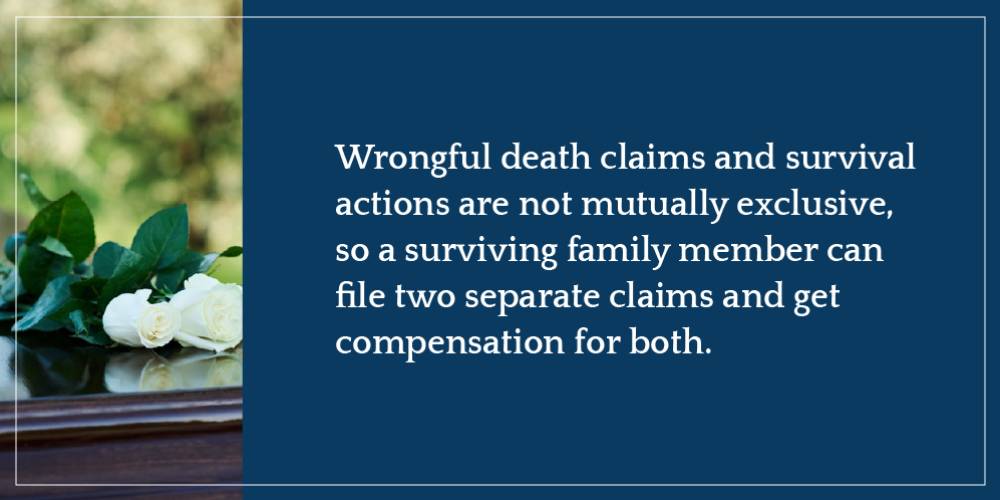
Understanding the Wrongful Death Act and Survival Act in Illinois
 Losing a family member because of the negligence of another individual can send devastating ripples throughout your household. On top of the emotional turmoil, there are typically numerous financial concerns that need to be addressed. A wrongful death can occur at any moment and understanding how to receive compensation for a loved one and for those left behind is a critical part of the healing process.
Losing a family member because of the negligence of another individual can send devastating ripples throughout your household. On top of the emotional turmoil, there are typically numerous financial concerns that need to be addressed. A wrongful death can occur at any moment and understanding how to receive compensation for a loved one and for those left behind is a critical part of the healing process.
A qualified Illinois wrongful death attorney with experience in these types of lawsuits can help you decipher the legalities and complexities that go into a wrongful death claim. At Schwartz Injury Law, we have represented many families seeking compensation for the deaths of their loved ones, and we have a proven track record of successful results.
When you work with our firm, you can be sure that we will conduct a thorough investigation into the fatal accident. In one case, we secured nearly $11 million in compensation following a truck collision that resulted in the death of a state trooper. In another case, we secured a $9.9 million award following the death of a man over 80 years old who was involved in a motor vehicle accident. Our highly experienced legal team is ready to go to trial to fight for the resolution that you deserve, and we will not accept any lowball settlement offers.
What Is the Illinois Survival Act?
The Illinois Survival Act is meant to serve as a deceased person’s voice and actions after a wrongful death occurs. The act enables the surviving relatives of the deceased the option to file a claim and recover financial compensation through an estate on behalf of the deceased. It will cover the same damages as if the deceased individual had survived. These damages can include:
-
Lost wages
-
Medical costs and expenses
-
Costs of damage and repairs to personal property
-
Pain and suffering
Any financial award under this act will be paid out to the deceased person’s estate according to their will. However, if the decedent died without a last will and testament, the settlement or verdict will be distributed according to the state’s intestate succession laws. This means that the award will be automatically divided up among the deceased person’s next of kin, giving priority to the surviving spouse and/or children.
At Schwartz Injury Law, we understand how important it can be to protect your loved one’s estate. We will make an aggressive case for their right to compensation, making sure to account for all of the damage that resulted from the accident. A full claim under the Illinois Survival Act should cover not only economic losses, but non-economic damages like your loved one’s agony before death as well.
How Does the Illinois Wrongful Death Act Impact These Cases?
The Illinois Wrongful Death Act is another act that allows the loved ones of a person taken from them due to a wrongful death to file a lawsuit to recover compensation for damages. Instead of covering damages for the deceased, these are meant specifically for the aggrieved family members. The damages that can be recovered are similar to those recoverable using the Illinois Survival Act. Some unique damages in a wrongful death claim include funeral expenses, the surviving family’s grief, and lost income the family would have benefited from.
Accidents that involve fatalities in which loved ones may recover damages can include:
-
Motor vehicle accidents where the negligent person was distracted, impaired, or driving under the influence (DUI)
-
Incidents at nursing homes and other care facilities
-
Medical malpractice
-
Slip and fall accidents
The one exception to wrongful death claims is workplace accidents. Compensation from fatal accidents on the job is usually paid through workers’ compensation, though the surviving family may be able to file a wrongful death claim if the death involved a liable third party.
Under the Wrongful Death Act, compensation goes to the next of kin in descending order of priority. The surviving spouse and children will be the first to benefit, followed by the parents, and then siblings. Note that compensation from the Wrongful Death Act and the Survival Act are not mutually exclusive. This means that a surviving family member can file two separate claims and get paid for both. Our attorneys will explore all of your options, leaving nothing off the table.

Statute of Limitations For Wrongful Death and Survival Claims
The statute of limitations is essentially a time limit for legal action. If you want to file a claim against another party for the death of your loved one, you must do it before the statute of limitation expires. Once the statute of limitations expires, you will not be able to take legal action against the party at fault. The statute of limitations for both acts – Survival and Wrongful Death – is two years in most cases. In wrongful death cases that had violent intent, the statute of limitations can extend to five years.
The biggest difference in the statute of limitations between the two acts is that using the Wrongful Death Act requires loved ones to file a claim within two years of when the death occurred. In the Survival Act, the statute of limitations is two years from the time the incident that led to the death occurred. In cases involving prolonged illness or coma, these dates may be significantly different.
At Schwartz Injury Law, our lawyers can help you take swift action, assisting with all of the required paperwork and taking steps to avoid unnecessary delays that can harm your claim.
Contact a Will County, IL Wrongful Death Attorney
The death of a loved one is a terrible ordeal for any family to go through. Matters are only made worse when the death is caused by another person’s negligence. At Schwartz Injury Law, we value all life and will fight tooth and nail to obtain every penny of compensation a family is entitled to. Our experienced Joliet, IL wrongful death lawyers are available to help your family during your time of need. With the necessary resources at our disposal, we can conduct a full investigation into your loved one’s death, securing as much evidence as possible to support your claim.
We are ready to hear out the details of your case. For a free consultation and a sympathetic ear, contact our office at 708-888-2160.







